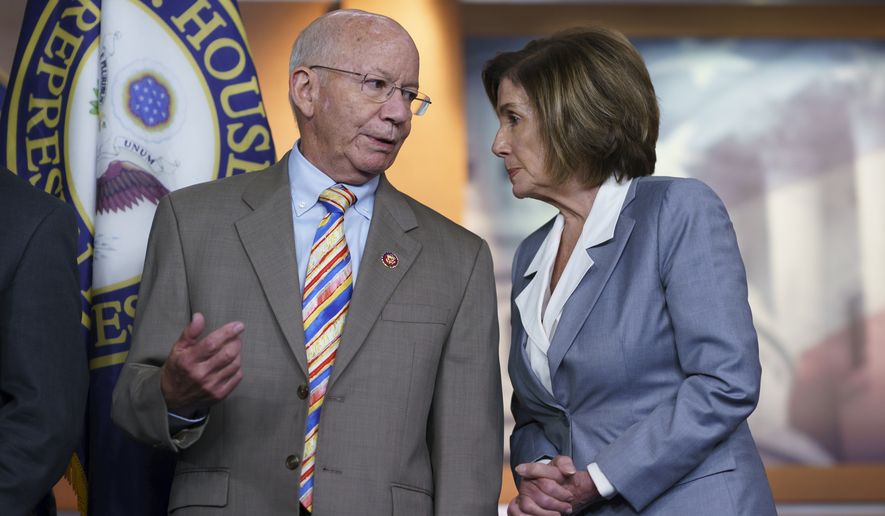House Democrats are trying to muscle their way into the infrastructure negotiations between President Biden and bipartisan senators, even going as far as threatening to scuttle the entire package.
House Transportation Committee Chairman Peter DeFazio, Oregon Democrat, threw a wrench into the talks this week by pledging to be more than just a “rubber stamp” for the final deal.
“At the moment they just want to send over the bipartisan bill and say we have to take it,” Mr. DeFazio said. “Which I’m not willing to do. … I’m not taking it.”
Mr. DeFazio and 30 other Democrats reiterated their intention on Wednesday in a letter to House Speaker Nancy Pelosi and Senate Majority Leader Charles E. Schumer.
“This is not just a question of a fair process for members on our side of the Capitol,” the lawmakers wrote. “We should reject any effort to categorically exclude the thorough, transparent and transformational process undertaken by the House.”
That position is shared by most senior House Democrats, who are bristling at the notion of being cut out of a major legislative deal after waiting years to see their party capture both Congress and the White House.
Mr. DeFazio, in particular, appears unwilling to stand by and see such a feat occur. As chairman of a committee with broad power over infrastructure issues, Mr. DeFazio is already mobilizing to put his imprint on the deal.
A primary concern of House Democrats is that the $1.2 trillion infrastructure deal, as it now stands, does not go far enough to address climate change.
“America is facing serious challenges — crumbling infrastructure, the threat of climate change, inequality and racial injustice, and foreign adversaries that threaten our domestic workforce and manufacturing sectors,” Mr. DeFazio wrote in his letter to leadership. “The decisions we make about how we invest in and rebuild our nation’s infrastructure will play a significant role in determining how we confront these challenges.”
An avowed supporter of the Green New Deal, Mr. DeFazio wants to see more funding for public transit and less for highway construction. There is also talk of mandating that any tunnel and road projects financed with federal money be built “green-friendly,” with concrete additives that absorb carbon.
The letter Mr. DeFazio and others sent to Democratic leaders also called for the final infrastructure package to include roughly 1,500 earmarks for individual lawmakers.
Plans by the House to amend the infrastructure proposal, which has yet to be finalized in the Senate, could derail the entire deal, however.
The infrastructure package has significant bipartisan support within the Senate, where at least 60 votes are needed to overcome a filibuster. Republican support, however, is likely to bleed if House Democrats load the package up with liberal priorities.
Republicans say Mr. DeFazio is putting his own pet projects and power above the good of the country by threatening to do so.
“All along, President Biden has called for bipartisanship on infrastructure, [Mr.] DeFazio’s strategy has been the complete opposite of that,” said a senior GOP aide. “We’ll see how this plays out, but the approach means he’s been unwilling to accept a bipartisan process that would still allow for significant progress towards his own priorities.”
Mr. DeFazio’s allies, though, say he’s only looking out for the best interests of Democrats and the House as a whole. They say that he’s not looking to kill the infrastructure deal, but rather force it into a joint House-Senate committee where both sides can negotiate on the final package.
Regardless of Mr. DeFazio’s desire, his actions have already emboldened other Democrats to demand more from the bipartisan infrastructure deal.
A group of senators, in particular, is pushing that the package include money authorizing a water and sanitation bill that passed the Senate this year.
“I want to make sure that they are fully funded,” said Sen. Tom Carper, a Delaware Democrat who is chairman of the Senate Environment and Public Works Committee. “I’m going to withhold my support until they are fully funded.”
• Haris Alic can be reached at halic@washingtontimes.com.




Please read our comment policy before commenting.